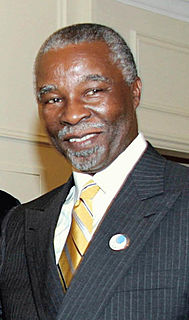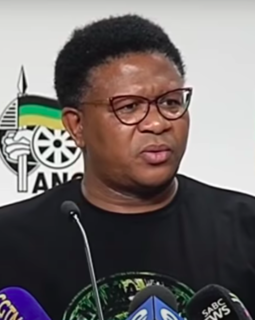Related Research Articles

The African National Congress (ANC) is a social-democratic political party in South Africa. It has been in power since the election of lawyer,activist and former political prisoner Nelson Mandela at the first free and fair elections in 1994,and has been re-elected at every election since,though with a reduced majority every time since 2004. Cyril Ramaphosa,the incumbent President of South Africa,has served as President of the ANC since 18 December 2017.

Thabo Mvuyelwa Mbeki is a South African politician who served as the second president of post-apartheid South Africa,from 16 June 1999 to 24 September 2008. On 20 September 2008,with about nine months left in his second term,Mbeki announced his resignation after being recalled by the National Executive Committee of the ANC,following a conclusion by judge C. R. Nicholson of improper interference in the National Prosecuting Authority (NPA),including the prosecution of Jacob Zuma for corruption. On 12 January 2009,the Supreme Court of Appeal unanimously overturned judge Nicholson's judgement but the resignation stood.

Oliver Reginald Kaizana Tambo was a South African anti-apartheid politician and revolutionary who served as President of the African National Congress (ANC) from 1967 to 1991.

Joe Slovo was a South African politician,and an opponent of the apartheid system. A Marxist-Leninist,he was a long-time leader and theorist in the South African Communist Party (SACP),a leading member of the African National Congress (ANC),and a commander of the ANC's military wing Umkhonto we Sizwe (MK).

Baleka Mbete is a South African politician who served as the Speaker of the National Assembly of South Africa from May 2014 to May 2019. She was previously Speaker of the National Assembly from 2004 to 2008,and Deputy President of South Africa from 2008 to 2009 under Kgalema Motlanthe. She was elected National Chairperson of the African National Congress in 2007 and re-elected in 2012 and served until 18 December 2017. On the 18th of December 2017,during the ANC's 54th conference,Gwede Mantashe was elected Mbete's successor as National Chairperson of the ANC.

Johannes "Joe" Modise was a South African political figure. He helped to found Umkhonto we Sizwe,the military wing of the African National Congress,and was its longest serving Commander in Chief,deputised at different points in time by Joe Slovo and Chris Hani. Modise headed MK for a 25-year period,from 1965 to 1990. He served as South Africa's first black Minister of Defence from 1994 to 1999 and led the formation of the post-independence defence force.
Jacob “Jackie”Sello Selebi was the National Commissioner of the South African Police Service from January 2000 to January 2008,when he was put on extended leave and charged with corruption. He was also a former President of African National Congress Youth League,South African ambassador to the United Nations from 1995 to 1998,and President of Interpol from 2004 to 2008. Selebi was found guilty of corruption on 2 July 2010 and sentenced to 15 years' imprisonment on 3 August 2010. However,he was released on medical parole in July 2012,after serving less than a year of his sentence,and lived at home until his death on 23 January 2015.

The 52nd National Conference of the African National Congress (ANC) was held in Polokwane,Limpopo,from 16 to 20 December 2007. At the conference,Jacob Zuma and his supporters were elected to the party's top leadership and National Executive Committee (NEC),dealing a significant defeat to national President Thabo Mbeki,who had sought a third term in the ANC presidency. The conference was a precursor to the general election of 2009,which the ANC was extremely likely to win and which did indeed lead to Zuma's ascension to the presidency of South Africa. Mbeki was prohibited from serving a third term as national President but,if re-elected ANC President,could likely have leveraged that office to select his successor.

Zola Sidney Themba Skweyiya was a South African politician who was Minister of Public Service and Administration from 1994 to 1999 and Minister of Social Development from 1999 to 2009. Skweyiya was re-elected to the National Executive Committee of the African National Congress in 2007.

Fikile April Mbalula is a South African politician who is currently serving as Minister of Transport. He previously served as both Minister and Deputy Minister of Police and Minister of Sports and Recreation. Mbalula is a member of the National Executive Committee of the African National Congress and former leader of the African National Congress Youth League. He is ethnically a Mpondomise,his clan name is Jola. Mbalula also serves as the head of elections for the African National Congress.
John Matshikiza was a South African actor,theatre director,poet and journalist.

The African National Congress (ANC) has been the governing party of the Republic of South Africa since 1994. The ANC was founded on 8 January 1912 in Bloemfontein and is the oldest liberation movement in Africa.

The Congress of the People (COPE) is a South African political party formed in 2008 by former members of the African National Congress (ANC). The party was founded by former ANC members Mosiuoa Lekota,Mbhazima Shilowa and Mluleki George to contest the 2009 general election. The party was announced following a national convention held in Sandton on 1 November 2008,and was founded at a congress held in Bloemfontein on 16 December 2008. The name echoes the 1955 Congress of the People at which the Freedom Charter was adopted by the ANC and other parties,a name strongly contested by the ANC in a legal move dismissed by the Pretoria High Court.
Steve Vukhile Tshwete was a South African politician and activist with the African National Congress. Involved in Umkhonto we Sizwe,Tshwete was imprisoned by the apartheid authorities on Robben Island from February 1964 to 1978. Tshwete resumed activities with the ANC and become a regional coordinator for the new United Democratic Front. He later lived in exile in Zambia with the ANC. After the first free elections in South Africa in 1994,he became the new government's first Sports Minister and later was Minister of Safety and Security.
The Southern Africa Freedom Trail is a route running through Lusaka,Zambia that leads to a number of historic sites significant to the region's anti-colonial and anti-apartheid struggles.

Zanele Mbeki is a feminist South African social worker who founded the Women's Development Bank. She is also a former first lady of South Africa.
The Dakar Conference was a historic conference between members of the Institute for Democratic Alternatives in South Africa (IDASA) and the African National Congress (ANC). It was held in Dakar,Senegal between 9 and 12 July 1987. The conference discussed topics such as strategies for bringing fundamental change in South Africa,national unity,structures of the government and the future of the economy in a free South Africa. The IDASA delegation from South Africa,participated in the conference in their private capacity and would later be condemned by the South African government for meeting a banned organization. The future indirect result of the conference was South African government talks with Nelson Mandela and his eventual meeting with P. W. Botha in 1989.
The Institute for Democratic Alternatives in South Africa (IDASA) later known as the Institute for Democracy in South Africa was a South African-based think-tank organisation that was formed in 1986 by Frederik van Zyl Slabbert and Alex Boraine. Its initial focus from 1987 was creating an environment for white South Africans to talk to the banned liberation movement in-exile,the African National Congress (ANC) prior to its unbanning in 1990 by the President F. W. de Klerk. After the South African election in 1994,its focus was on ensuing the establishment of democratic institutions in the country,political transparency and good governance. Caught up in a funding crisis after the 2008 global financial crisis,closed in 2013.
Penuell Mpapa Maduna is a South African politician and businessman. An anti-apartheid activist in his youth,Maduna was appointed to President Nelson Mandela's government in 1994. Thereafter he served as Minister of Mineral and Energy Affairs and,between 1999 and 2004,as Minister of Justice and Constitutional Development. Holding a doctorate of law from Unisa,he was also a long-time legal adviser to his party,the African National Congress,which he represented during the negotiations to end apartheid.

Operation Vula was a secret domestic programme of the African National Congress (ANC) during the final years of apartheid in South Africa. Initiated in 1986 at the ANC headquarters in Lusaka and launched in South Africa in 1988,its operatives infiltrated weapons and banned ANC leaders into the country,in order to establish an underground network linking domestic activist structures with the ANC in exile. It was responsible for facilitating the only direct line of communication between ANC headquarters and Nelson Mandela,who at the time was imprisoned and was discussing a negotiated settlement with the government on the ANC's behalf. The operation was disbanded in 1990,after its existence had been publicly revealed and eight of its leaders charged under the Internal Security Act with terrorism and plotting an armed insurrection.
References
- ↑ Davis, Gaye (August 15, 1997). "The voice of the ANC in exile". Mail & Guardian . Retrieved 13 June 2020.
- ↑ "True confessions of a ruthless propagandist". Mail & Guardian. Mail & Guardian. 29 November 1985. Retrieved 29 April 2021.
|first1=missing|last1=(help) - ↑ Davis, Gaye (August 15, 1997). "The voice of the ANC in exile". Mail & Guardian . Retrieved 13 June 2020.